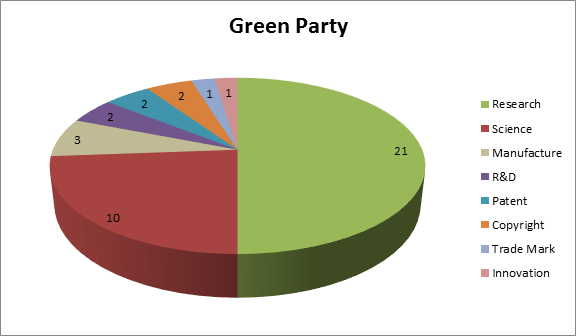Patents Trade Marks Designs Copyright
Part Two – Party Election Manifesto Analysis on Intellectual Property and Research and Innovation: The Green Party
May 01, 2015
In the second part of the Election Series, Mahir Raoof casts an eye over the Green Party manifesto and seeks to understand how they will grow the UK’s intellectual property, research and innovation sectors.
Led by Natalie Bennett, the Green Party of England and Wales are, as the name suggests, dedicated to environmental issues which they believe are the biggest threats on the global stage. With left of centre views, the Green Party is commonly considered a single issue party.
In its manifesto, the Green Party is billing itself as the ‘only real party of science’ stating that all of its policies are based on the best possible scientific evidence. The manifesto mentions research on many occasions, the word itself appearing 21 times. Unsurprisingly, the research mentioned in the manifesto is strongly focused on the environment as the party seek to encourage science and technology that provides environmental benefits. The research areas discussed in the Green Party’s manifesto can be broken down into three key areas: food, energy and transport.
Energy is given the most attention and pledges as it is seen as key to the party’s core values. The party promise that up to £35bn of public money would be spent over the next parliament in renewable energy generation as well as an additional £2.5bn driving an intensive research program for other renewable energy sources such as wave and tidal stream generators. These substantial amounts of money are accounted for within the party’s financial appendix.
The Green Party’s stance on food is that there should be significant research particularly driven towards farming. The manifesto states that the Green Party will, ‘Foster environmentally sustainable agriculture, land management and a secure food supply by properly supporting valid, rigorous and reliable research into all areas and types of farming including organic farming.’
An interesting stipulation put forward by the Green Party, however, is that basic research is adequately funded and is not controlled by large corporations.
A 2013 government report outlining the UK’s strategy for agricultural technologies estimates private sector investment into agricultural R&D is at around £100m per year. The same report goes on to state that in 2011/12 the government spent £450m on R&D within food and agriculture combined – so there is significant private sector investment.
A lot of research is often sponsored by corporations and larger businesses who work within knowledge transfer hubs with smaller, often more innovative firms. Such melting pots of private investment and resources combined with public facilities and grants encourage enterprise and drive innovation. To take control away from the corporations would reduce their incentive to undertake research. What the Green Party is proposing would arguably be difficult to put into practice and is a grey line that may need reviewing.
Electric vehicles are mentioned within the transport section of the manifesto as the party states that it will invest in charging points for buses and taxis, and cars where there are gaps in the public transport network.
The electric vehicle market is still very much in its infancy but research by the European Automobile Manufacturers’ Association in 2015 showed that the European electrical vehicle market grew by 37% last year of which the UK saw the highest uptake. There is also a lot of current innovation within the transport space, particularly with the continued development of driverless cars.
However, The Automobile Manufacturers’ Association went on to say that more policy incentives are needed to encourage a greater take up as, despite the market growth, only 0.6% of new car registrations were electric cars. The Green Party seemingly recognise this challenge and, presumably, will support uptake through policies.
According to the Green Party’s manifesto, all research and development is, of course, required to be done in an ethical manner with particular regard to animal and human welfare. The party are also categorically against any kind of research and development for nuclear and military applications so there would be limited to no opportunities for innovation within those spaces with the Green Party.
Intellectual property rights are mentioned as the party feel that both copyright and patents require review.
Within the manifesto, the Green Party states that it will ‘Make copyright shorter in length, fair and flexible and prevent patents applying to software.’ This follows on from an initial mention of copyright where the party state, ‘We need copyright laws that reward creators but are consistent with digital technologies.’
The Green Party’s manifesto also states that it would prevent the patenting of genes and living organisms.
Under current UK patent law, patents directed towards computer programs, as such, are prohibited. It is not clear what the Green Party would change to accomplish their goal of preventing patents applying to software, however this could arguably have a detrimental effect on companies developing computer implemented inventions. Similarly, current UK patent law includes prohibitions on the patenting of genes and living organisms and it is not clear, from their manifesto, what changes the Green Party are proposing to make.
In conclusion, the Green Party will be seeking to drive a real research and innovation culture particularly within technologies that have a positive effect upon the environment. Some of their policies however, particularly in regards to intellectual property rights, could arguably be seen as being anti-competitive and perhaps even be considered to stifle innovation.

For further information please get in touch with your usual contact at Swindell & Pearson or [email protected]